|
158 |
|
Sharing: It was the 3rd Sunday of Lent on 8 March 2015. The Readings that were read in the Eucharistic Celebrations all over the world on the same day are shown in the previous page: 1st Reading: Exodus 20:1-17, Responsorial: Psalm 19:8-11, 2nd Reading: 1 Corinthians 1:22-25 & Gospel Reading: John 2:13-25. We have extracted the Homilies Blessed Pope John Paul II, Pope Benedict XVI & Pope Francis I based on the aforesaid Readings to share with you, so that you could similarly be encouraged: |
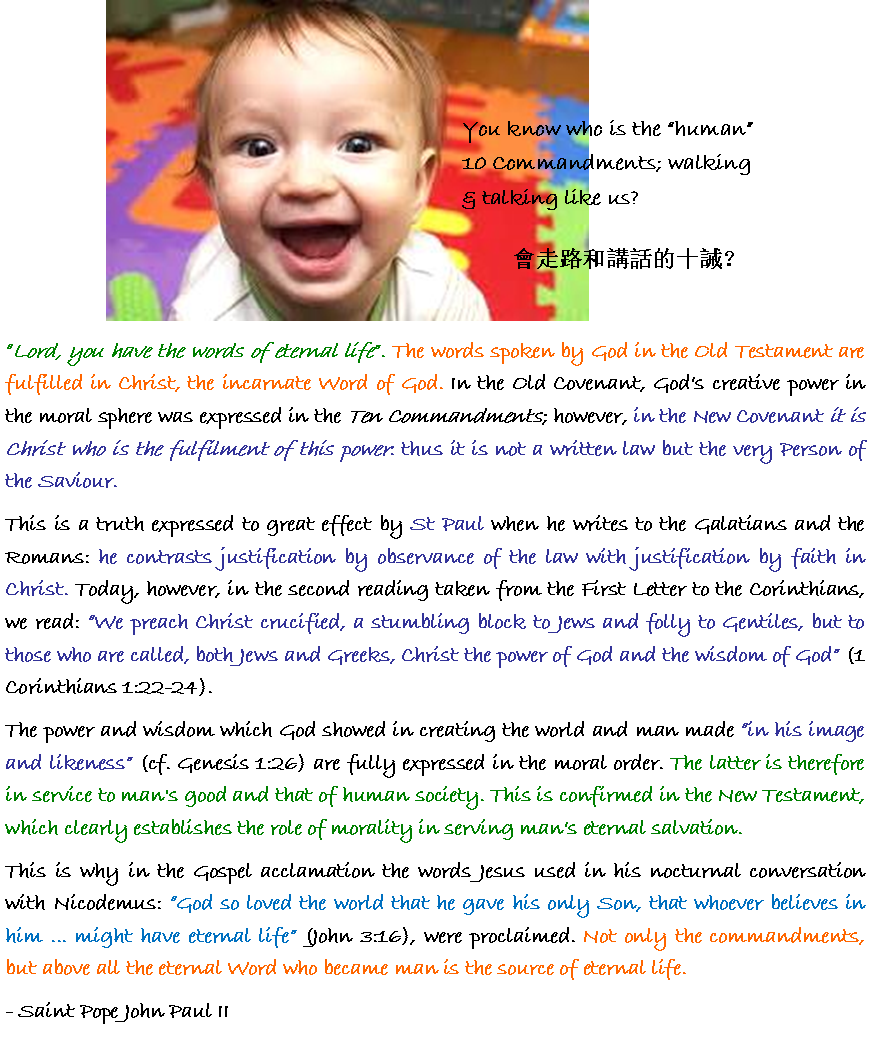
|
EUCHARISTIC CELEBRATION at THE parish HOMILY OF POPE JOHN PAUL II Sunday, 2 March 1997
1. “Lord, you have the words of eternal life” (cf. John 6:68).
The responsorial psalm proclaimed a few moments ago leads us to the heart of the message of today’s liturgy. The power of the divine word was manifested for the first time in the creation of the world, when God said: “Let there be” (cf. Genesis 1:3), calling all creatures into existence. But the biblical readings for this Third Sunday of Lent shed light on another dimension of the power of the word of God: that which concerns the moral order.
Yahweh gave the Ten Commandments to the chosen people on Mount Sinai, a mountain which has unique symbolic value in salvation history. This is precisely why a meeting on that mountain has been proposed for the Great Jubilee of the Year 2000 (cf. Tertio millennio adveniente, n. 53). Today’s first reading from the Book of Exodus particularly develops the first three commandments given to Israel, those of the so-called “first tablet”: “I am the Lord, your God.... You shall have no other gods before me.... You shall not take the name of the Lord, your God in vain.... Remember the Sabbath day, to keep it holy” (Exodus 20:2-3, 7-8).
The first commandment, in which the oneness of God is solemnly affirmed, is fundamental: there are no other divinities besides him. The invisible God, to whom no image made by human hands can do justice, manifests himself in the law given to Moses. With the incarnation of the Word, God became man, and thus the invisible God became visible and, from that moment, humanity can contemplate his glory. The question of the artistic portrayal of God was extensively examined at the Second Council of Nicaea and it was then made clear that, since the invisible God became man in the incarnation, it was legitimate for Christians to portray him in art.
Connected with the first commandment is the second, which does not only condemn the abuse of God's name, but is also meant to warn people against the idolatry that was widespread in pagan religions.
With regard to the third commandment: “Remember the Sabbath day, to keep it holy” (Exodus 20:8), the law is detailed and refers back to the original model of rest God gave us when he had completed creation.
On the other hand, the commandments of the so-called “second tablet” are described concisely. 3. “Lord, you have the words of eternal life”. The words spoken by God in the Old Testament are fulfilled in Christ, the incarnate Word of God. In the Old Covenant, God’s creative power in the moral sphere was expressed in the Ten Commandments; however, in the New Covenant it is Christ who is the fulfilment of this power: thus it is not a written law but the very Person of the Saviour.
This is a truth expressed to great effect by St Paul when he writes to the Galatians and the Romans: he contrasts justification by observance of the law with justification by faith in Christ. Today, however, in the second reading taken from the First Letter to the Corinthians, we read: “We preach Christ crucified, a stumbling block to Jews and folly to Gentiles, but to those who are called, both Jews and Greeks, Christ the power of God and the wisdom of God” (1 Corinthians 1:22-24).
The power and wisdom which God showed in creating the world and man made “in his image and likeness” (cf. Genesis 1:26) are fully expressed in the moral order. The latter is therefore in service to man's good and that of human society. This is confirmed in the New Testament, which clearly establishes the role of morality in serving man’s eternal salvation.
This is why in the Gospel acclamation the words Jesus used in his nocturnal conversation with Nicodemus: “God so loved the world that he gave his only Son, that whoever believes in him ... might have eternal life” (John 3:16), were proclaimed. Not only the commandments, but above all the eternal Word who became man is the source of eternal life.
4. Dear brothers and sisters of St Julian Martyr Parish! I am pleased to be here with you today, to celebrate the Eucharist on the Third Sunday of Lent. I greet the Cardinal Vicar, the Auxiliary of the area, your zealous parish priest, Fr Luciano D’Erme, the parochial vicar, the religious who live in this area and all of you who belong to this parish community, dedicated in a special way to the Immaculate Heart of Mary and the Merciful Heart of Jesus.
Today we naturally remember our venerable and beloved Brother, Cardinal Ugo Poletti, who died a few days ago. This parish, established in 1980, was one of more than 70 built by him during his long service to the Diocese of Rome. As I thank the Lord once again for having given me this capable Vicar General, I invite you all to pray for him, commending this chosen soul to God's mercy.
I am following the progressive phases of the mission with affection and attention, especially the distribution of St Mark’s Gospel to families and the practice of the Spiritual Exercises, which are taking place during this season of Lent. The programme of Spiritual Exercises is truly fitting, for they are an important help to Christians, who are called to “be renewed in spirit ... and [to] put on the new nature, created after the likeness of God in true righteousness and holiness” (Ephesians 4:23-24). Fruit of the Church's rich spiritual tradition, the Spiritual Exercises are a genuine answer to man's profound questions. I therefore recommend them to young people as part of their journey of vocational discernment, to Christian married couples, to families and to all who are sincerely searching for God.
5. “He spoke of the temple of his body” (John 2:21).
In the Gospel we again read the story about the driving of the merchants from the temple. St John’s description is vivid and eloquent: on one side there is Jesus, who, “making a whip of cords, drove them all, with the sheep and oxen, out of the temple” (John 2:14-15), and on the other are the Jews, particularly the Pharisees. The contrast is so strong that some of those present ask Jesus: “What sign have you to show us for doing this?” (John 2:18).
“Destroy this temple, and in three days I will raise it up” (John 2:19), Christ answers. To which the people reply: “It has taken 46 years to build this temple, and will you raise it up in three days?” (John 2:20). They had not understood —St John notes — that the Lord was talking about the living temple of his body, which, during the paschal events, would be destroyed by his death on the cross but would be raised up on the third day. “When therefore he was raised from the dead”, the Evangelist writes, “his disciples remembered that he had said this; and they believed the scripture and the word which Jesus had spoken” (John 2:22).
It is the paschal event that gives authentic meaning to all the various elements of today’s readings. At Easter the power of the incarnate Word is fully revealed, the power of the eternal Son of God, who became man for us and for our salvation.
“Lord you have the words of eternal life”. We believe that you are truly the Son of God. And we thank you for having made us sharers in your own divine life. Amen. |
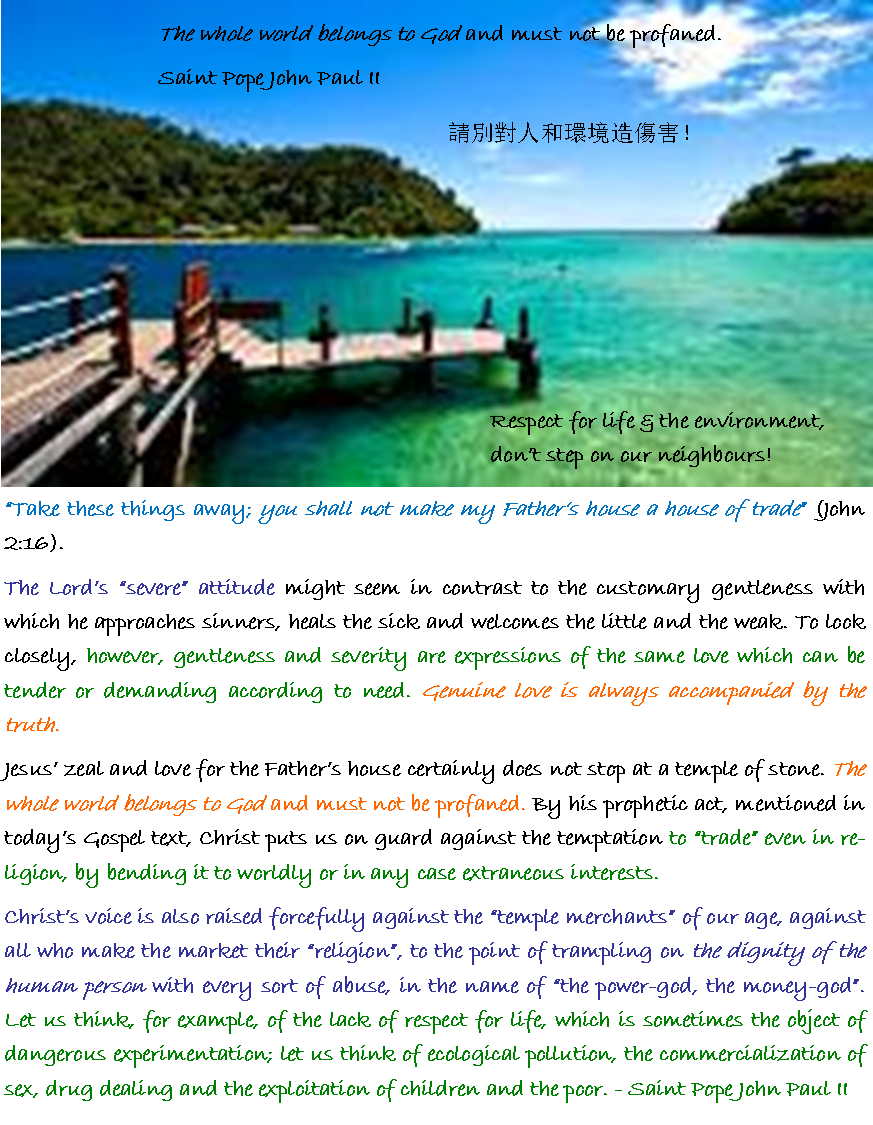
|
JOHN PAUL II ANGELUS - THIRD SUNDAY OF LENT Sunday, 2 March 1997
Dear Brothers and Sisters,
1. In the Gospel for this Third Sunday of Lent, St John tells us that, when Jesus found merchants and money-changers in the temple of Jerusalem, he made a whip of cords and drove them out with angry words: “Take these things away; you shall not make my Father’s house a house of trade” (John 2:16).
The Lord’s “severe” attitude might seem in contrast to the customary gentleness with which he approaches sinners, heals the sick and welcomes the little and the weak. To look closely, however, gentleness and severity are expressions of the same love which can be tender or demanding according to need. Genuine love is always accompanied by the truth.
Jesus’ zeal and love for the Father’s house certainly does not stop at a temple of stone. The whole world belongs to God and must not be profaned. By his prophetic act, mentioned in today’s Gospel text, Christ puts us on guard against the temptation to “trade” even in religion, by bending it to worldly or in any case extraneous interests.
Christ’s voice is also raised forcefully against the “temple merchants” of our age, against all who make the market their “religion”, to the point of trampling on the dignity of the human person with every sort of abuse, in the name of “the power-god, the money-god”. Let us think, for example, of the lack of respect for life, which is sometimes the object of dangerous experimentation; let us think of ecological pollution, the commercialization of sex, drug dealing and the exploitation of children and the poor.
2. The Gospel passage also has a more specific meaning, which refers to the mystery of Christ and announces the joy of Easter. Replying to those who asked him to confirm his prophecy with a sign, Jesus poses a sort of challenge: “Destroy this temple, and in three days I will raise it up” (John 2:19). The same Evangelist notes that he was speaking of his body, alluding to his future Resurrection. Christ’s humanity is thus presented as the true “temple”, the living house of God. It would be “destroyed” on Golgotha, but immediately “rebuilt” in glory, to be the spiritual dwelling place of all who accept the Gospel message and let themselves be formed by the Spirit of God.
3. May the Blessed Virgin help us to accept her divine Son’s words. Mary’s mission is precisely to lead us to him, repeating to us the invitation she gave the servants in Cana: “Do whatever he tells you” (John 2:5). Let us listen to her motherly voice! Mary knows well that the demands of the Gospel, even when weighty and severe, are the secret of true freedom and of our authentic joy. |
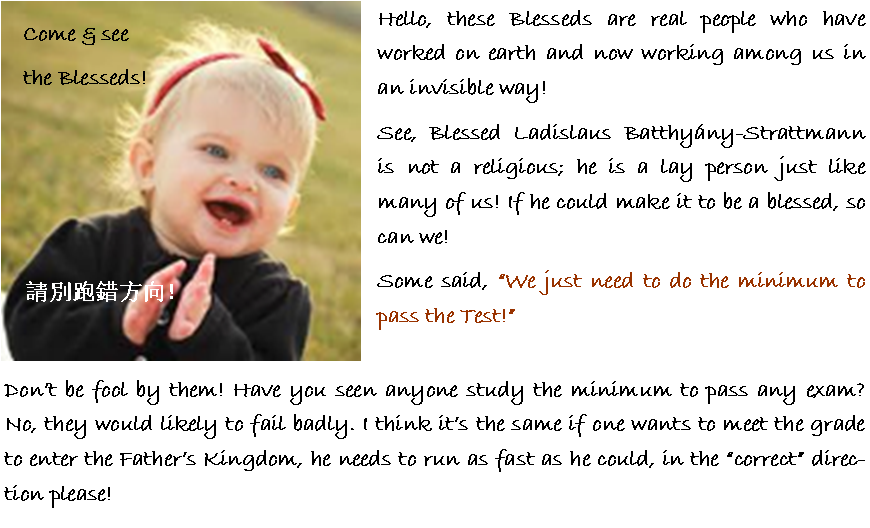
|
CAPPELLA PAPALE FOR THE BEATIFICATION OF FIVE SERVANTS OF GOD HOMILY OF JOHN PAUL II III Sunday of Lent, 23 March 2003
1. "God so loved the world that he gave his only begotten Son; whoever believes in him has eternal life" (chant before the Gospel, cf. John 3:16). These words of the liturgy of the Third Sunday of Lent invite us to contemplate with the eyes of faith the great mystery which we will celebrate at Easter. It is the full and definitive gift of the love of God realized in the death and resurrection of Jesus.
The mystery of redemption in which the faithful are called to participate was lived in an exceptional way by the new Blesseds whom today I have had the joy of elevating to the glory of the altars: Pierre Bonhomme, priest, founder of the Sisters of Our Lady of Calvary; María Dolores Rodríguez Sopeña, virgin, foundress of the Sopeña Catechetical Institute; María Caritas Brader, virgin, foundress of the Congregation of the Franciscan Sisters of Mary Immaculate; Juana María Condesa Lluch, foundress of the Congregation of the Handmaids of Mary Immaculate; Ladislaus (László) Batthyány-Strattmann, layman, father of a family.
2. "The commandment of the Lord is pure, enlightening the eyes" (Psalm 18 [19],10). This naturally applies to Fr Pierre Bonhomme, who in listening to the Word of God, notably the Beatitudes and the accounts of the Passion of the Lord, with Mary's guidance, found the way to live in intimacy with Christ and imitate him. The meditation of the Scripture was the incomparable source of all his pastoral activity, especially of his dedication to the poor, the sick, deaf-mutes and the disabled for whom he founded the Institute of the "Sisters of Our Lady of Calvary". Following the example of the new Blessed, we can repeat, "My model will be Jesus Christ; I am delighted to be like him whom I love". May Fr Bonhomme encourage us to become familiar with Scripture, to love our Saviour in order to be his untiring witnesses by our words and our life.
3. "I am the Lord, your God, who brought you out of the land of Egypt, out of the house of slavery" (Exodus 20,1). The great revelation of Sinai shows us God who redeems and frees from every slavery, then bringing his plan to fulfilment in the redeeming mystery of his only begotten Son, Jesus Christ. How can we fail to make this sublime message reach especially those who do not experience it in their hearts on account of their ignorance of the Gospel?
Dolores Rodríguez Sopeña felt this necessity and wished to respond to the challenge of making the redemption of Christ present in the world of work. For this reason, her goal was "to make all persons one sole family in Christ Jesus" (Constitutions of 1907).
This spirit is crystallized in the three foundations of the new Blessed: the Sopeña Lay Movement, the Institute of Women Catechists, called today Sopeña Catechists, and the Sopeña Social and Cultural Work. By means of these works, in Spain and in South America, a spirituality continues that fosters the building of a more just world proclaiming the saving message of Jesus Christ.
4. "Six days you shall labour and do all your work, the seventh day is a day of rest dedicated to the Lord" (Exodus 20,9.10). The reading of Exodus that we have heard reminds us of the duty of work. We must collaborate in the work of the Creator with our endeavour and in this way make the world better and more human. However, in the 19th century, the introduction of the woman into salaried work outside the home increased the risks for her life of faith and for her human dignity.
Blessed Juana Condesa Lluch, guided by her exquisite religious sensitivity, realized this. She lived a profoundly Christian youth: assisted at daily Mass in the church of the Patriarch, united her faith to an assiduous prayer. In this way she was prepared to dedicate herself totally to the love of God, founding the Congregation of the Handmaids of Mary Immaculate who, faithful to her charism, continue to be involved in the advancement of working women.
5. "We preach Christ crucified ... the power of God and the wisdom of God" (I Corinthians 1:23.24).
In today's second reading, St Paul reports how he proclaimed Jesus Christ, even to those who were rather hoping for miracles or human wisdom. The Christian must always proclaim the Lord without pulling back before difficulties, no matter how great they are.
In the course of history numberless men and women have proclaimed the Kingdom of God in the whole world. Among them must be counted Mother Caritas Brader, the foundress of the Franciscan Sisters of Mary Immaculate.
From the contemplative life of the enclosed convent of Maria Hilf in her Swiss homeland, one day the new blessed set out, first in Ecuador and then in Colombia, to consecrate herself entirely to the Mission ad gentes (to the nations). With unlimited confidence in divine Providence, she founded schools and homes, above all in poor areas, and in this way spread a deep Eucharistic devotion.
At the moment of death, she said to her sisters, "Do not abandon the good works of the Congregation, the alms and great charity for the poor, great charity among the sisters, allegiance to the bishops and priests". Beautiful lesson of a missionary life dedicated to the service of God and of neighbour.
6. "The weakness of God is stronger than men" (I Corinthians 1:25). These words of the holy Apostle Paul also reflect the devotion and life style of Blessed Ladislaus Batthyány-Strattmann, father of a family and doctor. He used the rich inheritance of his noble family to give free care to the poor and to build two hospitals. His greatest interest was not material goods; nor even less were success and career the goals of his life. He taught and lived this in his family and so he was the best teacher of the faith for his children. Drawing his spiritual energy from the Eucharist, he showed as many, as divine Providence led to him, the source of his life and mission. Blessed László Batthyány-Strattmann never placed earthly riches before our true good which is in heaven. May his example of family life and of generous Christian solidarity be an encouragement for all to follow the Gospel faithfully.
7. The holiness of the new Blesseds inspires us in turn to tend toward evangelical perfection, putting into practice all the words of Jesus. Here is an ascetical way of life that certainly is demanding, and yet possible for all.
May the Virgin Mary, Queen of all saints, support us with her maternal intercession. May the new Blesseds be our sure guides towards holiness. Amen.
CAPPELLA PAPALE FOR THE BEATIFICATION OF FIVE SERVANTS OF GOD JOHN PAUL II ANGELUS III Sunday of Lent, 23 March 2003
At the end of this solemn celebration, I desire to greet cordially and thank all the pilgrims who have gathered here to honour the new Blesseds.
To the French-speaking
Dear French-speaking pilgrims, I greet you who have come to Rome for the beatification of Fr Pierre Bonhomme. I especially greet Bishop Gaidon of Cahors, the Sisters of Our Lady of Calvary and the civil authorities who are present. Following the example of the new Blesseds, may you all know how to draw from the Word of God the energy for your daily mission.
To the German-speaking pilgrims
I cordially greet all our friends from Switzerland and Austria, who have come to Rome for the Beatification of Mother Caritas Brader and Doctor Ladislaus Batthyány-Strattmann. In different ways of life, the new Blesseds were wholeheartedly dedicated to the service of God and his commandment of love. May they be for you living examples of faith and witnesses of understanding among peoples.
To Hungarian pilgrims, to pilgrims from Slovakia
I wish to greet cordially the President of the Hungarian Republic, Mr Ferenc Mádl, the members of the Hungarian Bishops' Conference who are here, and the faithful who have traveled from Hungary and Slovakia. May the example of Blessed Ladislaus (László) Batthyány-Strattmann, who prayed the Rosary daily with his family, strengthen you in your veneration of Our Lady.
Concluding this celebration with the prayer of the Angelus, I wish to greet cordially the Cardinals, Bishops, priests and faithful, and, particularly, the sisters of the Institutes founded by the new Blesseds: Dolores Rodríguez Sopeña, Juana Condesa Lluch and Caritas Brader, and the civil authorities who have come from several Spanish-speaking countries. Edified by the examples of these extraordinary women, may they learn at the school of Mary to contemplate Jesus Christ, the Prince of Peace, supreme model for every Christian.
We now turn to the Blessed Virgin Mary, whom the new Blesseds loved and honoured with a special devotion. Above all at this time we ask her for the gift of peace. To her especially, we entrust the victims of these hours of war and their families who are suffering. I feel spiritually close to them with my affection and my prayer. |
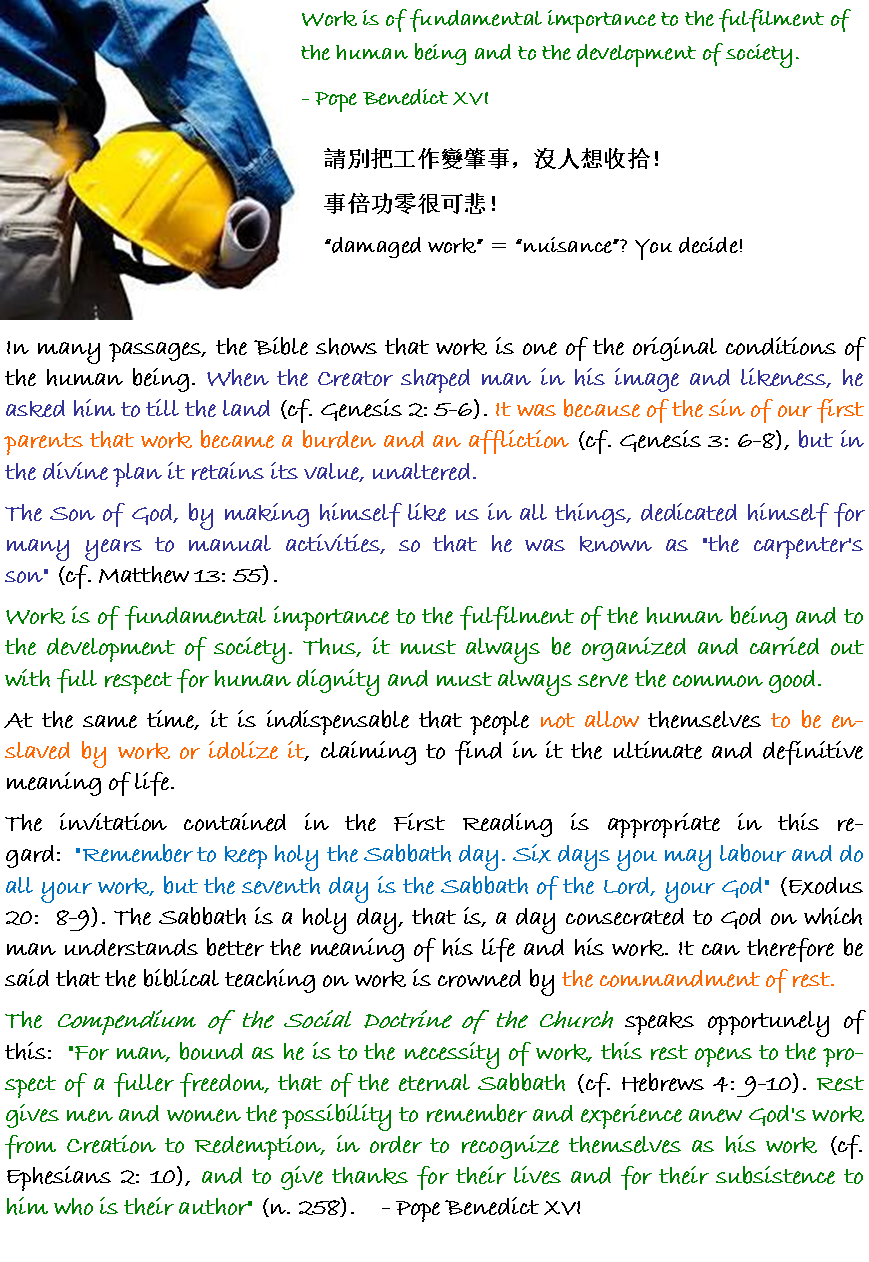
|
EUCHARISTIC CELEBRATION FOR ALL WORKERS HOMILY OF HIS HOLINESS BENEDICT XVI Vatican Basilica
We have listened together to a famous and beautiful passage from the Book of Exodus, in which the sacred author tells of God's presentation of the Decalogue to Israel. One detail makes an immediate impression: the announcement of the Ten Commandments is introduced by a significant reference to the liberation of the People of Israel. The text says: "I am the Lord your God, who brought you out of the land of Egypt, out of the house of bondage" (Exodus 20: 2).
Thus, the Decalogue is intended as a confirmation of the freedom gained. Indeed, at a closer look, the Commandments are the means that the Lord gives us to protect our freedom, both from the internal conditioning of passions and from the external abuse of those with evil intentions. The "nos" of the Commandments are as many "yeses" to the growth of true freedom.
There is a second dimension of the Decalogue that should also be emphasized: by the Law which he gave through Moses, the Lord revealed that he wanted to make a covenant with Israel. The Law, therefore, is a gift more than an imposition. Rather than commanding what the human being ought to do, its intention is to reveal to all the choice of God: He takes the side of the Chosen People; he set them free from slavery and surrounds them with his merciful goodness. The Decalogue is a proof of his special love.
The Gospel just proclaimed refers precisely to this: Jesus drove the merchants and money-changers out of the temple. Through the verse of a Psalm: "Zeal for your house has consumed me" (cf. Psalm 69[68]: 10), the Evangelist provides a key for the interpretation of this significant episode. And Jesus was "consumed" by this "zeal" for the "house of God", which was being used for purposes other than those for which it was intended.
To the amazement of everyone present, he responded to the request of the religious leaders who demand evidence of his authority by saying: "Destroy this temple, and in three days I will raise it up" (John 2: 19). These are mysterious words that were incomprehensible at the time; John, however, paraphrased them for his Christian readers, saying: "Actually, he was talking about the temple of his body" (John 2: 21).
His enemies were to destroy that "temple", but after three days he would rebuild it through the Resurrection. The distressful "stumbling block" of Christ's death was to be crowned by the triumph of his glorious Resurrection.
In this Lenten season, while we are preparing to relive this central event of our salvation in the Easter triduum, we are already looking at the Crucified One, seeing in him the brightness of the Risen One. In many passages, the Bible shows that work is one of the original conditions of the human being. When the Creator shaped man in his image and likeness, he asked him to till the land (cf. Genesis 2: 5-6). It was because of the sin of our first parents that work became a burden and an affliction (cf. Genesis 3: 6-8), but in the divine plan it retains its value, unaltered.
The Son of God, by making himself like us in all things, dedicated himself for many years to manual activities, so that he was known as "the carpenter's son" (cf. Matthew 13: 55). The Church has always, but especially in the last century, shown attention and concern for this social context, as the many social interventions of the Magisterium testify and the action of many associations of Christian inspiration show; some of them are gathered here today and represent the whole world of workers.
At the same time, it is indispensable that people not allow themselves to be enslaved by work or idolize it, claiming to find in it the ultimate and definitive meaning of life.
The invitation contained in the First Reading is appropriate in this regard: "Remember to keep holy the Sabbath day. Six days you may labour and do all your work, but the seventh day is the Sabbath of the Lord, your God" (Exodus 20: 8-9). The Sabbath is a holy day, that is, a day consecrated to God on which man understands better the meaning of his life and his work. It can therefore be said that the biblical teaching on work is crowned by the commandment of rest.
The Compendium of the Social Doctrine of the Church speaks opportunely of this: "For man, bound as he is to the necessity of work, this rest opens to the prospect of a fuller freedom, that of the eternal Sabbath (cf. Hebrews 4: 9-10). Rest gives men and women the possibility to remember and experience anew God's work from Creation to Redemption, in order to recognize themselves as his work (cf. Ephesians 2: 10), and to give thanks for their lives and for their subsistence to him who is their author" (n. 258).
Work must serve the true good of humanity, permitting "men as individuals and as members of society to pursue and fulfil their total vocation" (Gaudium et Spes, n. 35). For this to happen, technical and professional qualifications, although necessary, do not suffice; nor does the creation of a just social order, attentive to the common good.
I would like to entrust to St Joseph those young people who are finding integration into the working world difficult, the unemployed and everyone who is suffering hardship due to the widespread employment crisis.
Together with Mary, his Spouse, may St Joseph watch over all workers and obtain serenity and peace for families and for the whole of humanity.
May Christians, looking at this great Saint, learn to witness in every working environment to the love of Christ, the source of true solidarity and lasting peace. Amen! |
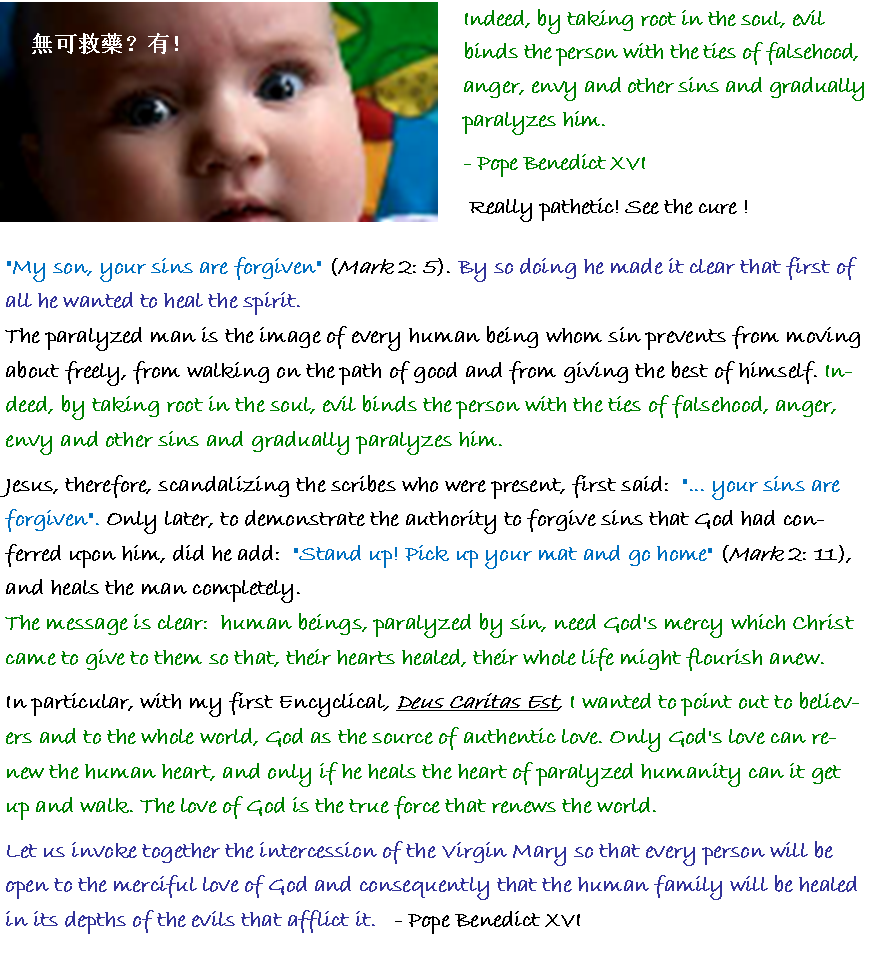
|
BENEDICT XVI ANGELUS Saint Peter's Square
Dear Brothers and Sisters,
On these Sundays, the liturgy presents the Gospel account of various healings brought about by Christ: last Sunday, the leper, and today, a paralyzed man lying on his bed, whom four people carried to Jesus. Having noted their faith, he said to the paralytic: "My son, your sins are forgiven" (Mark 2: 5). By so doing he made it clear that first of all he wanted to heal the spirit.
Jesus, therefore, scandalizing the scribes who were present, first said: "... your sins are forgiven". Only later, to demonstrate the authority to forgive sins that God had conferred upon him, did he add: "Stand up! Pick up your mat and go home" (Mark 2: 11), and heals the man completely.
Today too, humanity is marked by sin which prevents it from rapidly progressing in those values of brotherhood, justice and peace that with solemn declarations it had resolved to practise. Why? What is blocking it? What is paralyzing this integral development? The basic choice of my Predecessors, especially of the beloved John Paul II, was to lead the people of our time to Christ the Redeemer so that, through the intercession of Mary Immaculate, he might heal them. I too desire to continue on this path.
In particular, with my first Encyclical, Deus Caritas Est, I wanted to point out to believers and to the whole world, God as the source of authentic love. Only God's love can renew the human heart, and only if he heals the heart of paralyzed humanity can it get up and walk. The love of God is the true force that renews the world.
Let us invoke together the intercession of the Virgin Mary so that every person will be open to the merciful love of God and consequently that the human family will be healed in its depths of the evils that afflict it.
After the Angelus:
I greet all the English-speaking pilgrims at today's Angelus including students from Notre Dame High School in Connecticut. In a special way our hearts turn to all those suffering the devastating consequences of the landslide in The Philippines. I ask you to join me in praying for the victims, their loved ones and all those affected. May the grieving families experience the consolation of the Lord's presence and rescue workers be assured of our concern and support.
I wish you all a good Sunday.
20 April 2015, 6:00am SGT |